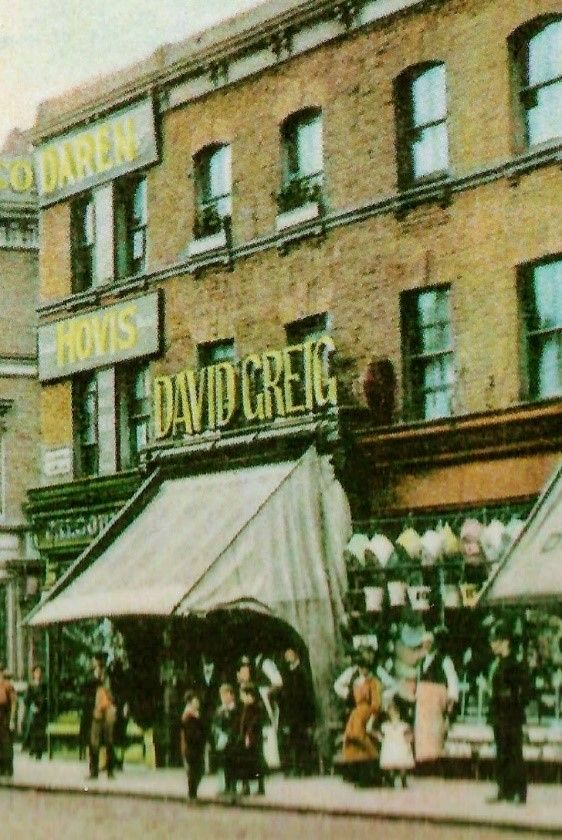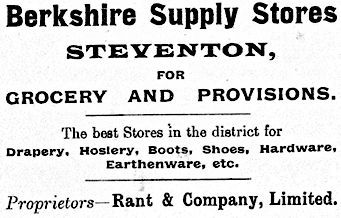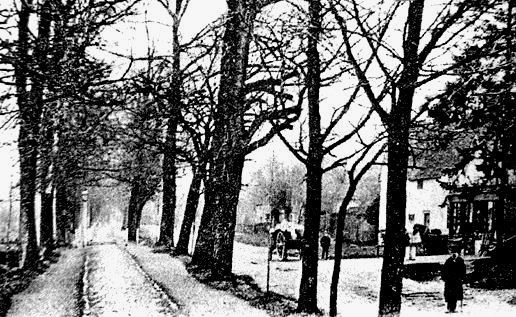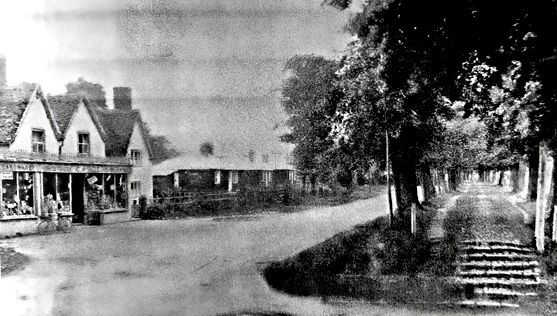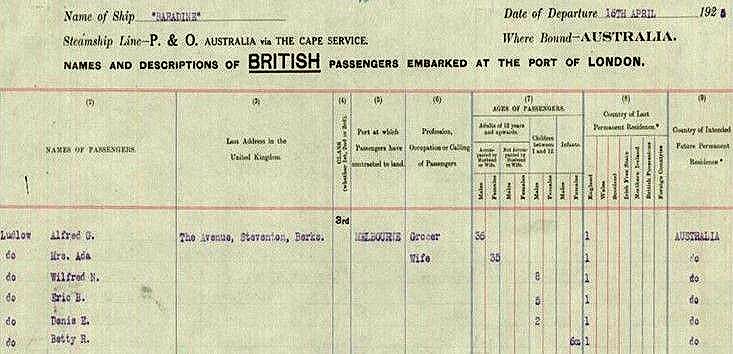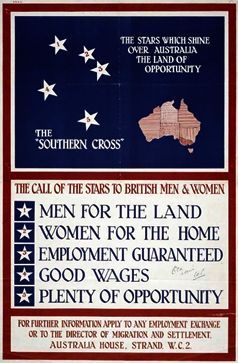The 1911 census shows that Alice and George were only 15 years older than Alfred, who was by then (April 1911) employed as a ledger clerk at ‘Universal Providers’ – a name used by Whiteleys department store, but also by grocery chain David Greig who had a shop a couple of miles away at Loughborough Junction.
ALFRED GEORGE LUDLOW: from Dover to Australia via Steventon (and back)
Chris Brickwood, Steventon History Society, March 2025
This project was triggered when a fellow member of Steventon History Society, Dick Bosley, raised a query in ‘Steventon News’ having found an advert in a 1924 dated parish magazine for grocer A G Ludlow: this gave their address as ‘The Avenue, Steventon’ – an address which none of us had come across at the time

1922 advert courtesy of another fellow member of SHS - Tony Sloggett
Alfred George Ludlow was born in Dover, Kent, in June 1888, son of Edwin (a railway guard) and Elizabeth (nee Hillier) Ludlow – at the time Alfred had at least seven older brothers and one older sister (Edith Maud), and there were at least two more sons and a daughter (Dorothy) born after Alfred. The family were still living in Clarendon Street, Dover, in 1901, but by 1910 Alfred had moved in with his uncle, aunt, three children and another boarder in Peckham: Uncle George Cruse was a bookseller’s assistant at a wholesale newsagent and publisher; Aunt Alice (nee Hillier) was nearly 20 years younger than her sister Elizabeth.
In December 1910 Alfred joined the Territorial Army’s 9th London Regiment: his Attestation showed that he had previously been in the Youth Battalion of The Buffs (the Royal East Kent Regiment), and was a clerk at what might be read as Harrods Ltd (C House):
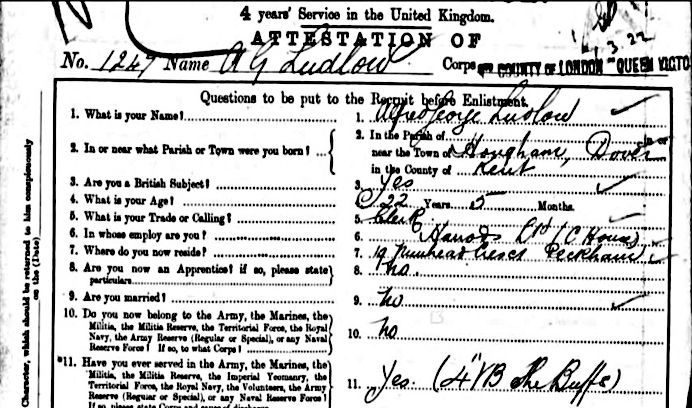
Also in 1911, Ada West - born in December 1889 in Storrington, West Sussex - was working as a book keeper at the family General Store in Cobham High Street, Surrey, run by her mother (Martha) and brother (Ernest). An older brother, Allen was running another grocer’s shop in Cobham with his wife Edith Maud (nee Ludlow) as sub-postmistress. Allen was also Parish Clerk, Verger & Sacristan at St Andrew’s Church, and a member of the Church Council 1913 -19.
Alfred was sent to France with the British Expeditionary Force in November 1914, where he was quickly promoted from Corporal to Sergeant before he was judged ‘Time Expired’ in November 1915 and returned to England where he was discharged in December.
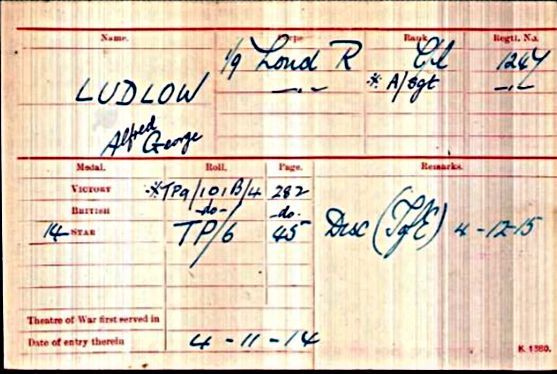
At some point Alfred must have got to know Ada through Edith – and they married in quarter 2 of 1916. Son Wilfred Norman was born in Cobham in March 1917, and then Eric Bertram in March 1919.
The established grocers in Steventon from the 1870s (not listed in the PO Directory in 1869 but in the 1877 Directory) until at least 1939 (Kellys Directory) were George Rant & Co, later Rant & Burgis (who in 1911 also had two shops in Abingdon plus others in Marcham, Longworth, and Faringdon), and by the mid-1920s Rant & Tombs: there were ten Rant & Tombs shops in Abingdon and district in 1930 including the one in Steventon. The Steventon shop at least was known as ‘Berkshire Supply Stores’.
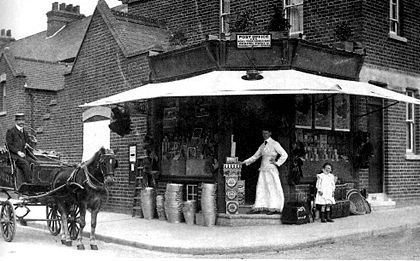
Rant’s grocery shop, Spring Road, Abingdon c. 1910.
From: https://www.heraldseries.co.uk/news/18002684.heralding-past-corner-shops-abingdon/
At least from the 1870s there were always two general grocers in the village (Thomas Richardson is listed in the PO Directory 1869; Matthew Baker in Kellys 1887; John & Eliza Margetts 1895 until at least 1911; Walter White in Kellys 1911) and one or two butchers (in the 1920s there were family butcher William Legge – later J Pearce, who added a horse and trap for hire - and W E Williams, family butcher and greengrocer in 1922 and also fishmonger by 1925: Williams was still the name of the village butcher until it closed in 1999).
What then brought the young Ludlow family to Steventon is unknown, but Kelly’s Directory for 1920 lists Rant & Burgis as grocers and Alfred George Ludlow at an unspecified address in Steventon as grocer & tea dealer, draper, boot and shoe factor, and hardware dealer: another regular ‘universal provider’!
The 1921 Census however shows Alfred and Ada living on the Causeway, which is also given as their place of work, with youngest son Eric and Ada’s mother Martha. Ernest West, Ada’s brother and Martha’s partner in the Cobham grocers, had died in the influenza epidemic that followed the war. Wilfred has stayed in Cobham with Allen and Edith West, and Alfred’s youngest sister Dorothy is living with them and helping in the shop. Denis Edwin (after his grandfather) Ludlow was born in Steventon in October 1922, and Betty Rhona in quarter 3 of 1924. Kelly’s Directory for 1924 lists both Rant & Tombs and Ludlow’s shops.
While the parish magazine adverts give Ludlow’s address as ‘The Avenue’ no other village references have been found to this name: it must have been a local/family name for the Causeway at the time:
The Ludlow’s grocery business was however short-lived: Charles Giles seems to have taken over the premises used by Ludlow’s c. 1925 and is then listed in Kellys until at least 1939.
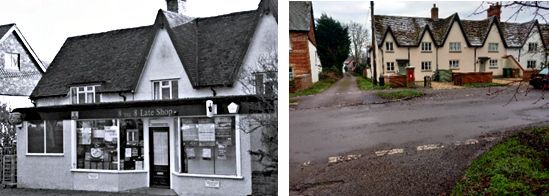
The same building later became the Co-op (left) until 2004 when it moved to the new High Street shop. The building was restored entirely to housing (pictured right in 2024, taken from the entrance to the Folly lane with Franks Lane ahead).
The family left the UK in April 1925 to emigrate to Australia on the P&O liner ‘Baradine’: Alfred gave his profession as Grocer, and his address (once again) as The Avenue, Steventon (Martha, now 74, is listed separately):
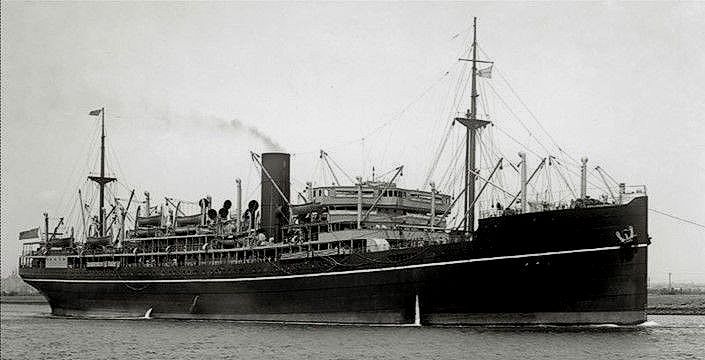
P&O liner 'Baradine' (built by Harland & Wolff in 1921).
Hover on picture for the passenger list.
The family landed in Melbourne, having been assured in a prospectus from the government of the state of Victoria that they would be able to run a profitable business: they set up a poultry farm on 22.5 acres of land at Narre Warren North – a (then) mostly rural area south-east of central Melbourne.
Alfred became president of the Narre Warren branch of the British Overseas Settlers’ Association – many of whose members, it seems, became disenchanted with the differences between what had been promised and what they actually found in Victoria. Letters were sent to the Australian and British newspapers, and representations were made to the state government.
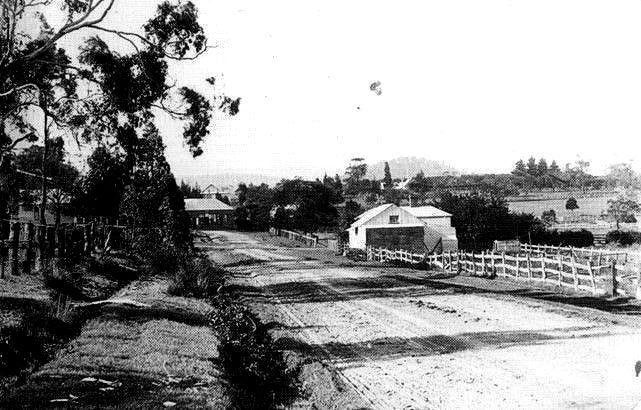
Narre Warren North in 1895. The old store and the Mechanics' Institute is in the background and Raduchel's blacksmith shop on the right.
From https://caseycardinialinkstoourpast.blogspot.com/
Alfred was one of the settlers who attended a meeting in April 1930 discussing drainage problems (reported in the Melbourne Weekly Times of 12th April 1930) and in May 1931 he gave evidence to a commission looking into migrants’ complaints. He is recorded as having said: “I have no faith or confidence in the country. I have had a pretty bad spin. I have lost £1400” (over £100,000 in today’s terms). He was asked whether he wanted to stay on his land and replied “Yes, but I want to see that it is absolutely certain that I can be satisfactorily settled. It was stated on the prospectus that the land is suitable for intense culture. The former owner of the land had grown oats on the land until it would not grow oats any more, and then sold it to the Water Commission.” He also said that the reason he had not continued with poultry- farming was that it was unprofitable. There was no export trade at that time, and there were gluts in the market. The land was over-capitalised. (This all as reported in the Melbourne Argus of 12th May 1931).
The Melbourne Sun News-Pictorial reported on 17th February 1933:
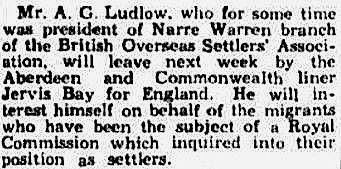
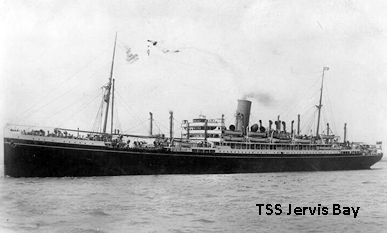
There were reports in Hansard (14th November 1933) of the problems faced by several hundred settlers in Victoria, of ‘inadequate’ offers of compensation by the Victorian Government, and suggestions that the British Government should offer aid and free passage back to the UK. How this was eventually resolved is unclear, but the Ludlows certainly returned.
When the whole Ludlow family left Australia and returned to England is unclear, but by the 1939 Register they were living – with Martha now 89 - in Wooton and employed (although the Genealogist’s transcription (below) has renamed half the family ‘Sudlow’):
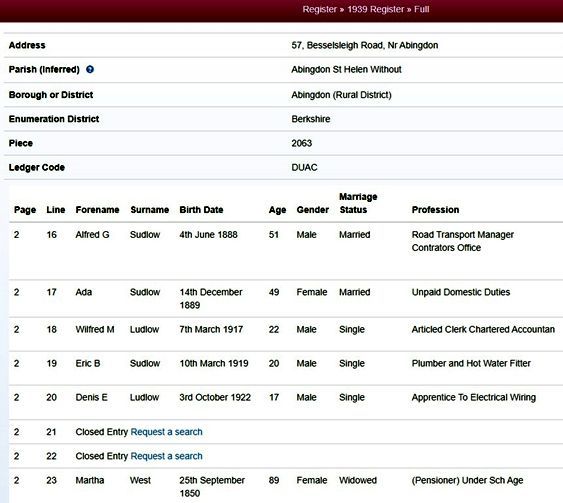
In WWII Wilfred served as a Gunner in the Royal Artillery, was posted to Cyrenaica (Libya), listed Missing in June 1942 during the ‘Fall of Tobruk’ where the garrison was forced to surrender and 33,000 were taken prisoner, and was later found to be a prisoner of war in Stalag IVB, the largest P.O.W. camp in Germany:
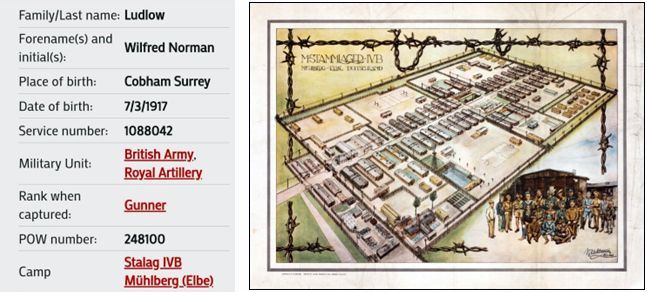
Wilfred was a P.O.W. until after the camp was liberated by the Red Army on 23rd April 1945: the Soviets didn’t let any UK or US prisoners leave the camp for a month or more, and Wilfred is only listed as released in July.
Eric joined the 2nd Battalion of the Gloucestershire Regiment as a Private and was killed in action in Normandy in July 1944:
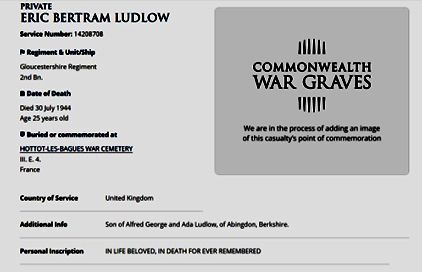
No confirmed military record has currently been found for Denis, although a Denis Edwin Ludlow did join the RAF after November 1943:
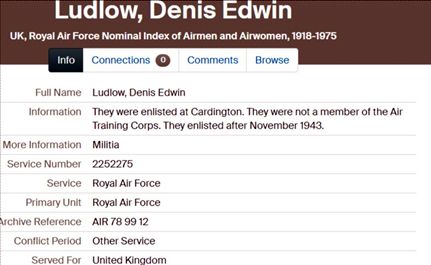
Wilfred married Eveline Joan Galley in Hendon in Quarter 2 1949 and moved to Epsom, Surrey and later to Wilmslow, Cheshire: Eveline died in Wilmslow in 1993 with Wilfred surviving there until 2010. (They may have had two children, David and Jane, but this is not confirmed).
Betty married Edward Frederick Norwood at St Helen’s, Dry Sandford, in July 1949. They moved to Uxbridge, Middlesex, where Edward had been born in 1919: Edward died in 2006, but no further information has been found about Betty.
Alfred and Ada – and, at least until 1950, Denis - stayed in Wootton: Alfred died in Abingdon Hospital on May 4th 1962 leaving £4013 to Ada, who died in April 1972 leaving an estate of £11,586. Denis at some point moved to the Reading area where he died in April 2009.
